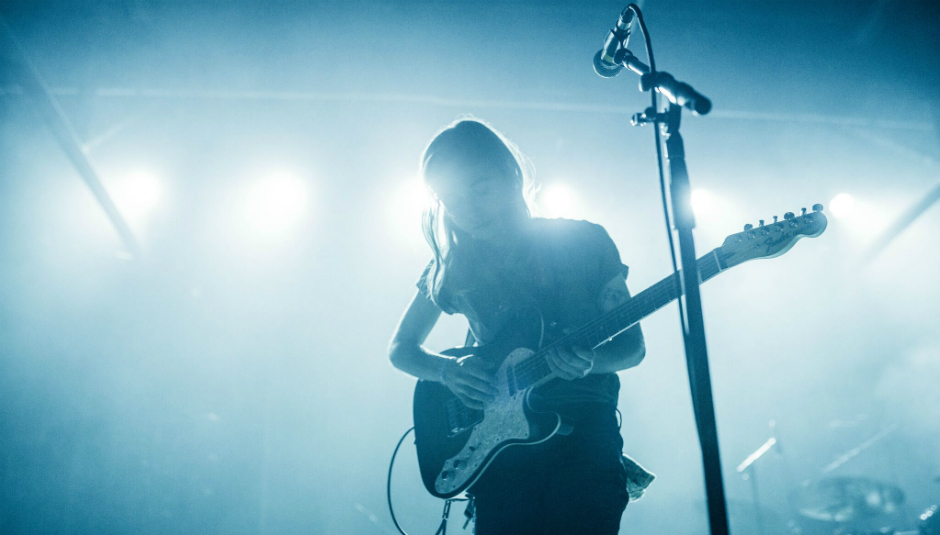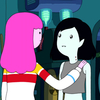Hyperbole comes easy when discussing Julien Baker. Critically acclaimed but under-appreciated, her 2015 debut Sprained Ankle enraptured a select audience, who readily disseminated her name among friends and friends of friends. She spread almost classically, through word-of-mouth and muted Youtube links, accumulating a fervently devoted fanbase.
Tackling issues of anxiety, depression, mortality, and faith, with elegant nuance and her magnificent quaver of a voice; Baker’s authentically one of the most gifted singer-songwriters around.
As a neurotic millennial it’s unavoidable that I connect with her music deeply, but she speaks to everyone, in soulful and distinct tones. The unity and generosity of her music is ubiquitous.
Coinciding with her captivating performance at Bush Hall, London at the start of June, I spoke to her about signing for Matador, her lyrical inspirations, and what she can reveal about her follow-up album this year.
DiS: Belated congrats on signing to Matador. What does working with such a big name in the industry offer you?
Julien Baker: I think the biggest thing advantage to working with Matador is getting to have the access to the support and resources of a bigger label while still working with a company that is independently owned and still prioritizes the creative growth of the artist. Aside from the obvious, practical capabilities Matador has because they are a more commercially successful label, the people there also have a lot of history and experience working with artists to help them achieve their goals and be successful; not in a strictly commercial sense, but in the sense of continually refining their craft, making the art they want to make and becoming the best artist they can be.
I had the pleasure of reviewing Sprained Ankle’s rerelease. What’s it like returning to that album since it entered the world two years ago, and have your thoughts on it (and the version of you articulated through it) changed at all?
Certainly, and I think that’s expected. The songs reflect such a specific time in my life, and were written to process feelings that I was deeply entrenched in. I think that the time since the creation of those songs has given me perspective on those feelings, and touring the record, performing the songs, having to revisit them so frequently has forced me to analyse them and figure out what caused or perpetuated those feelings in the first place. Sometimes the songs I have written portray a part of myself that feels more hopeless or negative than I would like to think of myself, but that’s okay, that “version of myself” can manifest in a song and not have to define my entire identity. If there are songs that don’t necessarily represent my thoughts or attitudes now, I can still feel like the emotions I expressed in them are valid and it’s okay to honor those feelings. Now, when I perform songs like that I try to find ways to assign them a new meaning so that they can be relevant or applicable to some element of my present.
An inevitably asinine question but one I consider completely valid in this case; just what are your artistic inspirations and reference points? I understand you grew up in the Memphis scene, which must have been stimulating.
Absolutely, I think many people’s immediate inclination is to reference monoliths of Memphis music culture, blues and country artists from Sun and Stax, and while that is a rich piece of the history here, I think it’s less that everyone derives their style directly from those artists and more that an awareness of music informed by that history is so subconsciously ingrained in the culture here that its impossible not to be. So even having grown up listening to local bands, from Big Star to say, Colour Revolt (from Mississippi), or Pezz (from Memphis), those antecedents made their way into my musical psyche through a chain of other influences. I definitely think having the exposure through the local scene to that very wide breadth of musical styles informed a lot of my musical sensibility.
From my perspective, you operate across multiple spectrums of music; while vocally and melodically you retain the strictures of Southern country and folk, much of your thematic content and tone aligns with the preoccupations of modern emo and indie rock. Do you identify with any particular aesthetic world or genre?
It must seem like a trite or predictable thing for an artist to say “I don’t wish to be put into a box”; obviously no one wants to be constrained by genre. Yet, as a solo artist I never know quite how to categorize my music and end up giving some vague explanation that has nothing to do with the sonic quality of my songs, like “Well, I sing and play guitar.” Joan Baez did that. Billy Bragg does that. What does that mean? But honestly the answer to that would be no, and I guess more accurately its that I suppose I’m not as discriminate in aligning myself with a certain genre, there are few genres if any I would say I don’t in some way identify with. Growing up I listened to mostly post-hardcore, or what’s considered “Emo” music, but tried never to let my exploration of music become limited by exclusivity, and its much the same now; the music that resonates with me most defies description based on scene. Every Time I Die and Big Thief both make me cry because they both deliver raw emotion in a viscerally honest and beautiful way.
Lyrically you’re very eloquent and graceful while using a simple, direct vocabulary; how much thought do you put into the specificity of language and word choice?
Thank you, that is kind of you to say. I am glad you believe so.
I put quite a bit, maybe too much thought, into what I say. Not only in my songs but in interviews, even daily personal conversations. I think language shapes our perception, so I try to be articulate, strive for specificity and clarity. But what is so maddening about human communication is that sometimes the most honest thing to say is not the simplest. Sometimes I get convoluted in the interest of trying to be accurate. (Any of the answers in this interview are a perfect example). I think its unwise to speak in absolutes, so usually instead of asserting a fact, I have to attach a disclaimer preamble about how it’s really impossible for me to know anything for certain, these are just my opinions, my reason is fallible like all humans’, etc. I’m sure it’s pretty exhausting for my friends, and interviewers...I just don’t like to speak carelessly. Maybe there’s such a thing as speaking too carefully.
There’s always an inevitable data loss in trying to convey a thought from one person to another, so many times we rely on inference, and instead of doing that I can get carried away trying to explain minutiae. But interestingly enough, when I am writing songs is when I feel most free from that demand for exactness. To me the poetry of a song is a refuge of language where ambiguity is permitted, even welcomed. When a lyricist gives us an image, a detailed excerpt of life, the listener has no good idea what that really signifies, we just colour in the details with information from our own lives and imbue the song with whatever significance we choose. I choose my words carefully when writing, but take care to preserve the parts of songs that come out organically, not feel like they should be edited too much, leave room for the questionable and unclear. Ironically, I think the unclear and mysterious is what ends up making us feel the most understood by each other, when we’re complicit in the not-knowing, aware that someone else is feeling something they don’t quite understand at the same time we are feeling something we don’t understand.
A thing that buttresses your work subtly but effectively is your Christian faith. To what extent has it influenced what you tackle in your music, or your lyrical style? ‘Rejoice’ appears the most concrete manifestation of this so far.
I think the reason why my faith appears in my music the way is does is less a deliberate decision to write songs that explicitly promote a personal conviction and more a result of my faith being so intertwined with how I view the world. My perspective and my ideologies are informed by my beliefs, faith is an integral part of my life and something that I spend a lot of time considering, so when I write songs about my own life I think they will inevitably be influenced by faith. ‘Rejoice’ is perhaps the most obvious discussion of religion in my music, but that song is less me making an assertion about the nature of God and more just expressing the presence of bitterness and gratitude at the same time, being honest about doubt, and I think it’s important to allow for complexity when portraying faith. To me that’s achieved well just by sharing personal experience. Even songs that have no apparent correlation to God or belief are still filtered through my own spiritual lens, and hopefully those things manifest themselves covertly in the themes like redemption or grace, which I feel are most indicative of divinity anyway.
Another great album released this year which channels its faith to uplifting effect is Sorority Noise’s You’re Not As ____ As You Think, in which Cameron Boucher also directly references your work, along with Modern Baseball and a few others. It sounded as a call of gratitude and solidarity, where your music has helped him cope and reflect positively. It isn’t the first instance of referencing reciprocity in this scene. To what extent is there a community here, enabling and helping one another through their music? Because it’s something very tangible – and deeply meaningful – for the listeners and fanbases out there.
Ah yes! Cam is such a dear friend. I think he and I have pretty similar personalities and have faced many of the same challenges, and I feel the very same way about his music—it’s given me so much comfort and inspiration. It’s rare that you actually get to spend time with the person who writes the songs that impact you so deeply, and it’s really a blessing.
For a lot of people, like Cam or myself who grew up playing music in very tight local scenes, the community aspect is vital. So much of the music is geared toward extending oneself and trying to feel understood, it feels like initiating a dialogue between artist and audience. I think the willingness to be that vulnerable establishes a really important connection between people and is what contributes to the sense of reciprocity and support.
This is a great time for music about expressing yourself around mental health and grief, but it’s also a great time for women in the scene. I spoke to Japanese Breakfast’s Michelle Zauner recently about this; after decades of straight white male hegemony indie rock – in its most sweeping, vague definition – is finally dominated by fantastic women artists; Mitski, Vagabon, the Crutchfields, Hop Along, to name just a handful. Although obviously it’s still not perfectly equitable, what does it mean to have these voices out there?
I agree, and I am ecstatic to see so many female artists flourishing, and being intentional about the way they use their platform for social discourse. I am grateful that within the indie rock scene or alternative music scene things appear to be shifting, my hope is that the increased prevalence of women in music does not serve to pacify the need for ongoing discussion of gender and sexuality, but that it destigmatizes those conversations and normalizes the presence of women and LGBT+ people in music.
Not a question, but a sincere thank you. Being myself an early 20-something erratically paralysed by anxiety and nihilism, your music has been so edifying and beneficial for me. I cannot wait for the new record
Thank you! It means so much to me to know my music has a positive impact on anyone at all, it’s the greatest gift of being a musician, and it is what makes me so thankful for having the job I have.
For more information about Julien Baker, please visit her Bandcamp page.






















